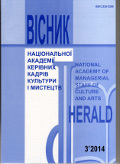СОЦІОКУЛЬТУРНА КРИТИКА СВІДОМОГО ТА НЕСВІДОМОГО У СТРУКТУРІ КУЛЬТУРОТВОРЕННЯ: НЕОФРЕЙДИЗМ
Social and cultural criticism of conscious and unconscious in cultural activities: Neo-Freudianism
Author(s): Andriy PetrushkevychSubject(s): Psychoanalysis, Sociology of Culture
Published by: Національна академія керівних кадрів культури і мистецтв
Keywords: conscious; unconscious; Neo-Freudianism; Karen Horney; Erich Fromm; cultural activities; culture;
Summary/Abstract: This paper focuses on the first key works in which there was a revision of classical psychoanalytic theory of interaction conscious and unconscious, namely, – Karen Horney "The Neurotic Personality of our Time", "New Ways in Psychoanalysis", Harry Stack Sullivan "The Interpersonal Theory of Psychiatry", Erich Fromm "Beyond the Chains of Illusion: my encounter with Marx and Freud". After all, they have formed a new theoretical and methodological conception, that consider the social aspect of the content and operation of the unconscious, influence of society and culture on the formation of man and the nature of a culture activities.Horney began as an orthodox adherent of Freud, but quite soon questioned the main thesis of Freudianism – the biological nature of the unconscious, showing that the nature of the unconscious is not rooted in the biological nature of instincts, but in the society and its culture, which make a decisive impact on the formation of cultural traditions that underlie the nature and mentality of the person.In culturology literature (unlike in psychological) Horney’s writings are usually associated with the school of the psychoanalytic culturalism or cultural Freudianism, remembering together with the works of H. S. Sullivan, author of interpersonal theory of psychiatry, who also noted the social background of the unconscious. However, being involved in practical psychoanalytic work, they have been not interested in the broader context of cultural or philosophical generalizations. In this regard, more interesting is the work of Erich Fromm, a representative of the American line of the Frankfurt School, freudomarxist, adherent of humanistic psychoanalysis, who also for a long period of time worked with K. Horney and H. S. Sullivan, co- founded the Association for the Advancement of Psychoanalysis.Erich Fromm tries to build his concept of the social unconscious in a coordinate system of existing descriptions of the Freudian individual unconscious and the Jungian collective unconscious, not applying the sharp criticism on their address, but rather seeks complement to existing theories, revealing some drawbacks.Thus, denying the biological nature of the unconscious solely as a repository of individual instinctual desires Erich Fromm nevertheless notes that "in some way, Freud was engaged in "social unconscious" when talking about the suppression incestual aspirations characteristic of all civilizations". While acknowledging the importance of scientific statements of the founder of psychoanalysis, Erich Fromm points out that if we consider only certain aspects of the individual unconscious, then the man will not be presented as a integrity person and will not able to define place in society, and thus to integrate into a culture process. Defending the position of radical humanism scientist argues the need for a new reading of the unconscious contents: "If the discovery of the unconscious means approaching the sense of self humanity, then there is no need to stop at the opening of the individual unconscious, it is necessary to extend this process and to discover the social unconscious".Unlike Freud, who took out the epiphenomenons of the unconscious by the method of free association, dream interpretation, during the clinical work, Erich Fromm, beginning from the work "Escape from Freedom" does this on the basis of broad cultural generalizations, developing social character types generated from the Middle Ages through the Reformation era to modern capitalism as a kind of manifestation of the social unconscious.In paper "Beyond the chains of illusion: my encounter with Marx and Freud" philosopher attempts to generalize his concept of the social unconscious. It converts biologically deterministic unconscious desires of a sexual nature that is guided only by infantile pleasure principle, in the ontological sense, instincts, into the unconscious, which have historically shaped by the culture and society and in its interaction with the conscious is the source of cultural activities; describes new mechanisms and factors of extrusion ideas and forms of thought unwanted by society. Erich Fromm defines the social unconscious as "those areas of suppression, which are common to most members of the society. The content of the repressed elements is what this society cannot allow to bring to awareness to its members, if it wants to continue to operate successfully on the basis of their own contradictions".Fromm’s philosophical cultural anthropology is rather eclectic. Thus, we can obviously compare the theory of social character as a manifestation of the social unconscious and Jungian archetype Persona of collective unconscious. The concept of social filter finds a match in the second Freudian topica, where the "super-ego" plays the role of censor, defense mechanism in relation to the "Ego". However, this does not reduce the role of Fromm’s research, because namely in his writings are shown, that:meaning of unconscious was understood on a new level: not only as a repository of biological sexual instincts, but as determine social and cultural source;integrity of the person can be described only through the interaction of the conscious and the unconscious, which in addition to individual aspects reflect sociocultural impact on a person;unconscious, along with conscious acts as a socially constructed culture force.So, the study of problems of psychoanalytic paradigm within the theoretical Cultural Studies aims to trace the transformation of the interpretation of its basic concepts and update its categorical apparatus. The author concludes that in analyzed works for the first time we can see a fundamental shift to understanding unconscious not as a repository of biological sexual instincts, but as the socio-cultural sphere, which acts as a cultural positive force.
Journal: Вісник Національної академії керівних кадрів культури і мистецтв
- Issue Year: 2014
- Issue No: 3
- Page Range: 120-126
- Page Count: 7
- Language: Ukrainian

